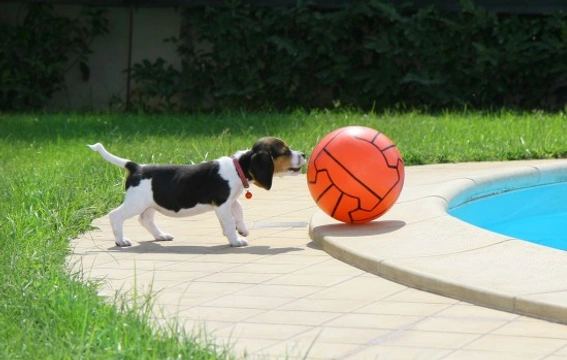
Outdoor hazards that can be a threat to your puppy
The outdoor world is great! This is likely to be your puppy’s first response to starting to go outside, once they get over their initial nerves and uncertainty. Puppies love being able to explore the outdoors and encounter all of the exciting, interesting new stimulus that provides such a formative part of their development into adult dogs. However, the outdoors can also be a potentially dangerous place for puppies- and while this is true to some extent for all dogs, puppies are exponentially more at risk, as they are new to the environment and have yet to learn the common-sense tricks that will keep them safe, meaning that they need almost constant supervision.
If your puppy is just beginning to explore the outside world or is almost ready to start to go out, read on to learn about the potential hazards that the outside world can present, in order to avoid them.
Viruses and infections
Your puppy should not go outside in public before they have received both stages of their initial vaccinations and got the all clear from the vet, in order to protect them against the various sources of illness and infection that they might run into outside. Your puppy should also be wormed and flea treated to prevent them from contracting worms or other parasites, and kept away from areas that are heavily trafficked by other dogs until their immune systems have had a chance to develop.
Rubbish
What to us is discarded rubbish can appear to be a source of endless fascination for the young puppy! For dogs and puppies, rubbish really has it all- delicious (disgusting!) smells, possible scraps of food, something to dig around in and lots of different textures to investigate. It is important to train your puppy not to pick up rubbish or scraps when outside, but until you have managed to do this, keep a close eye on them to ensure that they are not at risk of injuring themselves or eating something unsuitable while truffling around.
Other dogs
Adult dogs usually give a lot of leeway to puppies when playing and socialising, and it is important that your puppy spends plenty of time when young learning about other dogs and how to play and interact with them. But pay some mind to the dogs that your puppy is exposed to; never let your puppy run up to or get into the personal space of a dog that is on a lead, and check with other owners that you encounter if their dog is good with others before you let your puppy go and play.
Toxins and chemicals
Grassy areas and areas that are planted up may have fertilisers, weed killers or toxins in the soil or on the plants themselves, so you should take care of what you use in your own garden and what the ground may have been treated with in other areas. Bark chippings and cocoa husks that are often used for landscaping are also potentially toxic to your puppy, so again, avoid using them in your own garden and keep an eye on what is used elsewhere.
Plants
Puppies like to chew on things, and if they spot an interesting looking plant, this might seem like fair game. Remember that many plants are toxic to dogs, and while dogs usually become discouraged by a particularly bitter taste, puppies will often chew first and think later, placing them more at risk. Don’t plant anything in your own garden that might be toxic to your dog, and again, take care when walking to pay some mind to the plants that you pass and that your puppy investigates.
Water
While most dogs can swim, if your puppy decides to launch themselves into a stream, lake or pond without warning, they might not be able to get back out easily, and you may not be able to help them. Take care when walking your dog around water and watch carefully to see how they react to it, and if they are showing an interest in possibly going for a dip.
Sticks
Always provide dog-suitable toys for your puppy, such as balls, Frisbees and other equipment that is designed to stand up to the rigours of young puppies’ teeth and not pose a hazard. While the humble stick was considered to be a perfectly suitable dog toy for hundreds of years, it is not advisable to let your puppy play with a stick, in order to keep them safe. Sticks may pose a hazard from pointy ends or thorns, and may splinter and be inadvertently swallowed. Do not encourage your puppy to pick up sticks when out walking!
Road traffic
Finally, one of the greatest hazards to the puppy is cars, and other road traffic. Adult dogs usually develop a healthy respect for traffic out of a combination of learned common sense and training, something that puppies have yet to achieve. Always keep your puppy on a lead when outside of an enclosed area, and make sure that your fences are sufficient to keep your puppy enclosed and safe when out in the garden. Start teaching your puppy about the road as soon as possible, and train them not to run off or cross the road on their own.



